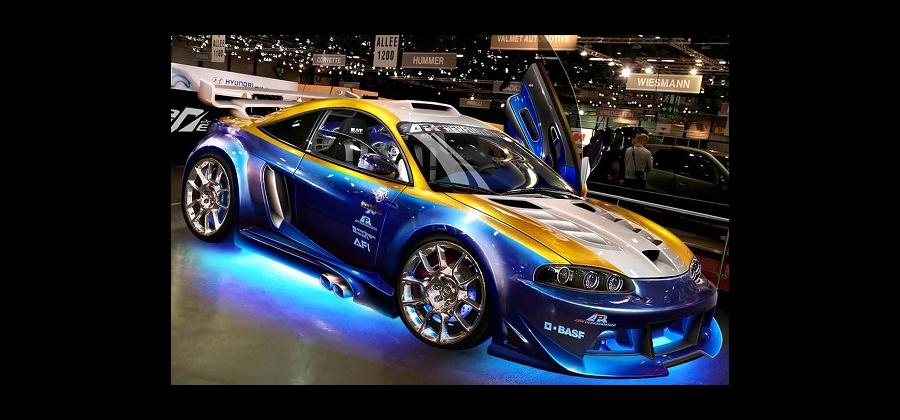
ABS - the plastic for car tuning

Vehicle tuning with ABS plastic. Learn more about the material and how you can grind, glue and shape ABS.
A plastic like ABS is very popular in car tuning or for the production of individual body parts, especially because of the many possibilities to take on even complex contours and shapes. Due to the relatively simple processing or shaping that can be carried out by anyone with half a technical talent, plastics are the first choice for bodystyling your car.
We would like to explain the tuning plastic ABS to you in a little more detail and show you the processing possibilities of ABS so that you too will soon be able to produce your very own side skirts, bumpers, rear diffuser or spoiler for your vehicle.
Requirements for the plastic in car tuning
There are many supporters, but just as many opponents of plastic in the tuning scene. One hears again and again plastic does not go on my car.
It should be pointed out to the latter that hardly any vehicle body can do without plastic, because bumpers of series-produced vehicles have been made of ABS for decades. Even ready-made body kits, front spoilers or rear spoilers, if they are to have road approval, are usually made of high-quality, impact-resistant ABS plastic. There are also cheap versions made of GRP (glass-fibre plastic composite), but these usually do not have an ABE (general operating permit) and are also nowhere near as robust as the higher-quality body parts made of ABS.
Plastics in vehicle tuning have various advantages compared to body parts. For one thing, they are significantly lighter than metal, which should be of particular interest to those who want to achieve the highest possible performance-to-weight ratio. ABS is also much easier to shape and process than metal, because thermoforming, i.e. exposure to heat, allows ABS to be shaped into almost any conceivable form without the need for welding or ironing. Another decisive factor is that plastics do not rust.
Registration in road traffic
If a vehicle is to be approved for road traffic and not just driven on the Nordschleife or some other race track, the materials used should be approved in accordance with the StVZO (Road Traffic Licensing Regulations). If this is not the case, the worst that can happen is that the vehicle, which has been lovingly and painstakingly tuned by hand, is not approved and its operating licence is withdrawn.
Body components, for example, must not have any sharp edges that could injure road users. This also applies in particular to the splintering behaviour of the materials used. ABS plastics meet the requirements for splintering behaviour and are therefore suitable for approval in road traffic.
Longevity of the plastic
ABS is an extremely robust and impact-resistant plastic, so it does not break with the slightest knock. So-called parking bumps, which usually result in an unsightly dent in the case of metal body parts, usually only lead to minor laughing damage, if any, in the case of ABS. Another advantage of plastics in vehicle tuning.
Workability of the plastic
Few people will glue entire plastic sheets to the vehicle, so the processability of plastic parts in the tuning scene is also a very important criterion. ABS can be processed with very simple tools, such as a handsaw, a jigsaw, a router, a Dremel©, or all other woodworking tools, and without welding skills or experience in metal construction. ABS is also excellent for gluing or painting (more on this later) and can be hot formed at temperatures between XX°C and XX°C.




Machining ABS plastic
As already mentioned, ABS is very easy to process. Simple woodworking tools, such as conventional saws or routers, are sufficient to cut the plastic to size. ABS can also be cut with a CO2 laser or turned. Even drilling holes with a simple cordless screwdriver and a drill for metal is no problem.
Fine machining steps can be carried out with metal arrows or sandpaper, so that you can produce body parts for your vehicle that are accurate to a tenth of a millimetre without needing any great knowledge.
Bonding ABS is also possible with suitable plastic adhesives such as our Ruderer L530.
The warm shaping of ABS, for example the folding or bending of radii, is just as feasible under the influence of heat as the deep-drawing of prefabricated ABS plastic parts by heat and vacuum.
Painting ABS
Whoever takes the trouble to tune his vehicle and creates individual body parts from ABS plastic will certainly not be satisfied with leaving these parts in the corresponding plastic colour. In 99.9% of cases, it is desired that the self-made tuning parts of the body kit are also painted in the colour of the car. However, this is not a problem with ABS, because this plastic can be painted very well.
In order to achieve a really hard-wearing paint finish that resembles the scratch-resistant paint of a new car, we recommend that the plastic surfaces be thoroughly cleaned before painting and that a plastic bonding agent be used beforehand.
You can buy our ABS plastic panels for your vehicle tuning here.
Please note that we can also mill parts from ABS to your exact specifications. All Information on milled parts can be found on the information page of our shop.